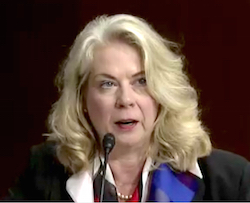
By caring for aging loved ones, unpaid family caregivers jeopardize their chances of having enough money to pay for their own needs as they advance in years, Catherine Collinson, president of the Transamerica Center for Retirement Studies and Transamerica Institute, told those attending a Senate Special Committee on Aging hearing Wednesday, where the topic was retirement security. And senior living plays a part, she said.
“Given increases in longevity and the high cost of assisted living and long-term care, many workers will be called upon to be an unpaid family caregiver for an aging parent or loved one — and at a time in which they are balancing their careers and raising children,” Collinson said. “These responsibilities can involve decisions such as reducing work hours or taking time out of the workforce, which can negatively affect their own future retirement in terms of reduced income, savings and accruing of pension benefits.”
An estimated 43.5 million adults in the United States have provided unpaid care in the past 12 months, Collinson said, adding that the number includes 34.2 million people who are caring for someone aged 50 or more years.
“The ‘typical’ caregiver is a 49-year-old female currently caring for a 69-year old female relative who needs care because of a long-term physical condition,” she said. “She has been providing care for four years, on average, spending 24.4 hours per week. She is typically employed and working an average of 34.7 hours per week.”
Employers can take steps to help their workers stabilize their futures by offering flexible work schedules and working arrangements as well as the ability to shift from full-time to part-time and back again, Collison said. A recent survey by the Transamerica Center for Retirement Studies, however, found that just 58% of employers accommodate caregiving employees by offering flexible work schedules, 44% offer the ability to shift from full-time to part-time work and back again when ready, and 36% offer flexible working arrangements such as telecommuting, she added.
Employers also must understand that they have legal obligations to employees who are caregivers, Collison said. “Fewer than half (47%) say that they allow their employees to take unpaid leave covered by the Family and Medical Leave Act,” she said, adding that large companies are more likely than small ones to recognize the law.



